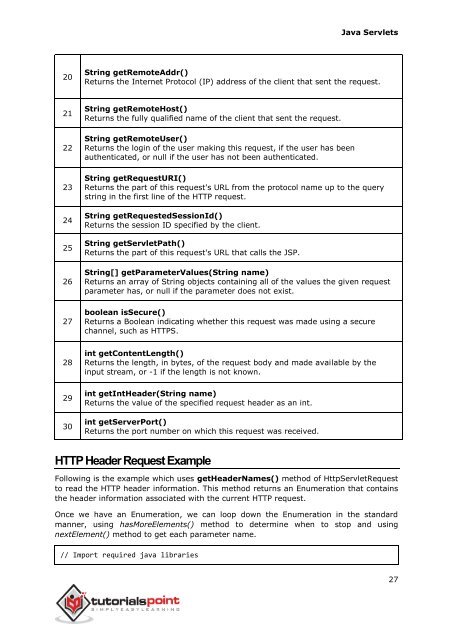Create successful ePaper yourself
Turn your PDF publications into a flip-book with our unique Google optimized e-Paper software.
Java Servlets<br />
20<br />
String getRemoteAddr()<br />
Returns the Internet Protocol (IP) address of the client that sent the request.<br />
21<br />
22<br />
String getRemoteHost()<br />
Returns the fully qualified name of the client that sent the request.<br />
String getRemoteUser()<br />
Returns the login of the user making this request, if the user has been<br />
authenticated, or null if the user has not been authenticated.<br />
23<br />
24<br />
25<br />
26<br />
String getRequestURI()<br />
Returns the part of this request's URL from the protocol name up to the query<br />
string in the first line of the HTTP request.<br />
String getRequestedSessionId()<br />
Returns the session ID specified by the client.<br />
String getServletPath()<br />
Returns the part of this request's URL that calls the JSP.<br />
String[] getParameterValues(String name)<br />
Returns an array of String objects containing all of the values the given request<br />
parameter has, or null if the parameter does not exist.<br />
27<br />
boolean isSecure()<br />
Returns a Boolean indicating whether this request was made using a secure<br />
channel, such as HTTPS.<br />
28<br />
int getContentLength()<br />
Returns the length, in bytes, of the request body and made available by the<br />
input stream, or -1 if the length is not known.<br />
29<br />
30<br />
int getIntHeader(String name)<br />
Returns the value of the specified request header as an int.<br />
int getServerPort()<br />
Returns the port number on which this request was received.<br />
HTTP Header Request Example<br />
Following is the example which uses getHeaderNames() method of HttpServletRequest<br />
to read the HTTP header information. This method returns an Enumeration that contains<br />
the header information associated with the current HTTP request.<br />
Once we have an Enumeration, we can loop down the Enumeration in the standard<br />
manner, using hasMoreElements() method to determine when to stop and using<br />
nextElement() method to get each parameter name.<br />
// Import required java libraries<br />
27


